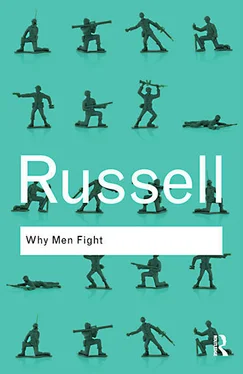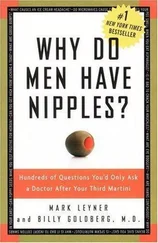Bertrand Russell - Why Men Fight
Здесь есть возможность читать онлайн «Bertrand Russell - Why Men Fight» весь текст электронной книги совершенно бесплатно (целиком полную версию без сокращений). В некоторых случаях можно слушать аудио, скачать через торрент в формате fb2 и присутствует краткое содержание. Город: London, Год выпуска: 2010, ISBN: 2010, Издательство: Routledge, Жанр: Философия, Публицистика, на английском языке. Описание произведения, (предисловие) а так же отзывы посетителей доступны на портале библиотеки ЛибКат.
- Название:Why Men Fight
- Автор:
- Издательство:Routledge
- Жанр:
- Год:2010
- Город:London
- ISBN:978-0-203-86469-2
- Рейтинг книги:3 / 5. Голосов: 1
-
Избранное:Добавить в избранное
- Отзывы:
-
Ваша оценка:
- 60
- 1
- 2
- 3
- 4
- 5
Why Men Fight: краткое содержание, описание и аннотация
Предлагаем к чтению аннотацию, описание, краткое содержание или предисловие (зависит от того, что написал сам автор книги «Why Men Fight»). Если вы не нашли необходимую информацию о книге — напишите в комментариях, мы постараемся отыскать её.
— discusses war, pacifism, reason, impulse and personal liberty, and greatly contributed to Russells fame as a formidable social critic and anti-war activist.
“The supreme principle, both in politics and in private life, should be to promote all that is creative, and so to diminish the impulses and desires that centre around possession.”
Bertrand Russell “Russell is one of the most profound thinkers of the modern age.”
The New York Times
Why Men Fight — читать онлайн бесплатно полную книгу (весь текст) целиком
Ниже представлен текст книги, разбитый по страницам. Система сохранения места последней прочитанной страницы, позволяет с удобством читать онлайн бесплатно книгу «Why Men Fight», без необходимости каждый раз заново искать на чём Вы остановились. Поставьте закладку, и сможете в любой момент перейти на страницу, на которой закончили чтение.
Интервал:
Закладка:
If men had any strong sense of a community of nations, nationalism would serve to define the boundaries of the various nations. But because men only feel community within their own nation, nothing but force is able to make them respect the rights of other nations, even when they are asserting exactly similar rights on their own behalf.
An analogous development is to be expected, with the course of time, in the conflict between capital and labour, which has existed since the growth of the industrial system, and in the conflict between men and women, which is still in its infancy.
What is wanted, in these various conflicts, is some principle, genuinely believed, which will have justice for its outcome. The tug of war of mutual self-assertion can only result in justice through an accidental equality of force. It is no use to attempt any bolstering up of institutions based on authority, since all such institutions involve injustice, and injustice once realized cannot be perpetuated without fundamental damage both to those who uphold it and to those who resist it. The damage consists in the hardening of the walls of the Ego, making them a prison instead of a window. Unimpeded growth in the individual depends upon many contacts with other people, which must be of the nature of free co-operation, not of enforced service. While the belief in authority was alive, free co-operation was compatible with inequality and subjection, but now equality and mutual freedom are necessary. All institutions, if they are not to hamper individual growth, must be based as far as possible upon voluntary combination, rather than the force of the law or the traditional authority of the holders of power. None of our institutions can survive the application of this principle without great and fundamental changes; but these changes are imperatively necessary if the world is to be withheld from dissolving into hard separate units each at war with all the others.
The two chief sources of good relations between individuals are instinctive liking and a common purpose. Of these two, a common purpose might seem more important politically, but, in fact, it is often the outcome, not the cause, of instinctive liking, or of a common instinctive aversion. Biological groups, from the family to the nation, are constituted by a greater or less degree of instinctive liking, and build their common purposes on this foundation.
Instinctive liking is the feeling which makes us take pleasure in another person’s company, find an exhilaration in his presence, wish to talk with him, work with him, play with him. The extreme form of it is being in love, but its fainter forms, and even the very faintest, have political importance. The presence of a person who is instinctively disliked tends to make any other person more likeable. An anti-Semite will love any fellow-Christian when a Jew is present. In China, or the wilds of Africa, any white man would be welcomed with joy. A common aversion is one of the most frequent causes of mild instinctive liking.
Men differ enormously in the frequency and intensity of their instinctive likings, and the same man will differ greatly at different times. One may take Carlyle and Walt Whitman as opposite poles in this respect. To Carlyle, at any rate in later life, most men and women were repulsive; they inspired an instinctive aversion which made him find pleasure in imagining them under the guillotine or perishing in battle. This led him to belittle most men, finding satisfaction only in those who had been notably destructive of human life—Frederick the Great, Dr. Francia, and Governor Eyre. It led him to love war and violence, and to despise the weak and the oppressed—for example, the “thirty thousand distressed needlewomen,” on whom he was never weary of venting his scorn. His morals and his politics, in later life, were inspired through and through by repugnance to almost the whole human race.
Walt Whitman, on the contrary, had a warm expansive feeling towards the vast majority of men and women. His queer catalogues seemed to him interesting because each item came before his imagination as an object of delight. The sort of joy which most people feel only in those who are exceptionally beautiful or splendid Walt Whitman felt in almost everybody. Out of this universal liking grew optimism, a belief in democracy, and a conviction that it is easy for men to live together in peace and amity. His philosophy and politics, like Carlyle’s, were based upon his instinctive attitude towards ordinary men and women.
There is no objective reason to be given to show that one of these attitudes is essentially more rational than the other. If a manfinds people repulsive, no argument can prove to him that they are not so. But both his own desires and other people’s are much more likely to find satisfaction if he resembles Walt Whitman than if he resembles Carlyle. A world of Walt Whitmans would be happier and more capable of realizing its purposes than a world of Carlyles. For this reason, we shall desire, if we can, to increase the amount of instinctive liking in the world and diminish the amount of instinctive aversion. This is perhaps the most important of all the effects by which political institutions ought to be judged.
The other source of good relations between individuals is a common purpose, especially where that purpose cannot be achieved without co-operation. Such organizations as trade unions and political parties are constituted almost wholly by a common purpose; whatever instinctive liking may come to be associated with them is the result of the common purpose, not its cause. Economic organizations, such as railway companies, subsist for a purpose, but this purpose need only actually exist in those who direct the organization: the ordinary wage-earner need have no purpose beyond earning his wages. This is a defect in economic organizations, and ought to be remedied. One of the objects of syndicalism is to remedy this defect.
Marriage is (or should be) based on instinctive liking, but as soon as there are children, or the wish for children, it acquires the additional strength of a common purpose. It is this chiefly which distinguishes it from an irregular connexion not intended to lead to children. Often, in fact, the common purpose survives, and remains a strong tie, after the instinctive liking has faded.
A nation, when it is real and not artificial, is founded upon a faint degree of instinctive liking for compatriots and a common instinctive aversion from foreigners. When an Englishman returns to Dover or Folkestone after being on the Continent, he feels something friendly in the familiar ways: the casual porters, the shouting paper boys, the women serving bad tea, all warm his heart, and seem more “natural,” more what human beings ought to be, than the foreigners with their strange habits of behaviour. He is ready to believe that all English people are good souls, while many foreigners are full of designing wickedness. It is such feelings that make it easy to organize a nation into a governmental unit. And when that has happened, a common purpose is added, as in marriage. Foreigners would like to invade our country and lay it waste, to kill us in battle, to humble our pride. Those who co-operate with us in preventing this disaster are our friends, and their co-operation intensifies our instinctive liking. But common purposes do not constitute the whole source of our love of country: allies, even of long standing, do not call out the same feelings as are called out by our compatriots. Instinctive liking, resulting largely from similar habits and customs, is an essential element in patriotism, and, indeed, the foundation upon which the whole feeling rests.
If men’s natural growth is to be promoted and not hindered by their environment, if as many as possible of their desires and needs are to be satisfied, political institutions must, as far as possible, embody common purposes and foster instinctive liking. These two objects are interconnected, for nothing is so destructive of instinctive liking as thwarted purposes and unsatisfied needs, and nothing facilitates co-operation for common purposes so much as instinctive liking. When a man’s growth is unimpeded, his self-respect remains intact, and he is not inclined to regard others as his enemies. But when, for whatever reason, his growth is impeded, or he is compelled to grow into some twisted and unnatural shape, his instinct presents the environment as his enemy, and he becomes filled with hatred. The joy of life abandons him, and malevolence takes the place of friendliness. The malevolence of hunchbacks and cripples is proverbial; and a similar malevolence is to be found in those who have been crippled in less obvious ways. Real freedom, if it could be brought about, would go a long way towards destroying hatred.
Читать дальшеИнтервал:
Закладка:
Похожие книги на «Why Men Fight»
Представляем Вашему вниманию похожие книги на «Why Men Fight» списком для выбора. Мы отобрали схожую по названию и смыслу литературу в надежде предоставить читателям больше вариантов отыскать новые, интересные, ещё непрочитанные произведения.
Обсуждение, отзывы о книге «Why Men Fight» и просто собственные мнения читателей. Оставьте ваши комментарии, напишите, что Вы думаете о произведении, его смысле или главных героях. Укажите что конкретно понравилось, а что нет, и почему Вы так считаете.












